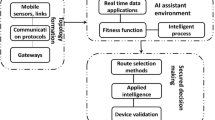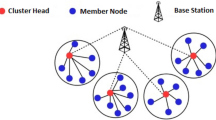Abstract
The Wireless Sensor Networks are used to monitor physical or environmental conditions in different environments. The main challenge in collecting data in these networks is adopting a TDMA mac protocol to allocate time slots to nodes that considers the minimum power consumption and delay. We propose an adaptive and distributed TDMA scheduling protocol for slot assignment in wireless sensor network called AD-TDMA. The AD-TDMA mac protocol saves energy by offering a suitable awake-sleep state scheduling for nodes and applies depth-first-search to send node data in network as routing path. AD-TDMA provides a reduced end-to-end delay by minimizing buffering and reusing of time slots by nodes which are outside each other’s interference range. In AD-TDMA, the TDMA scheduling schema is created by nodes distributedly. Every node in its lifetime updates its scheduling distributedly according to the exist conditions in network. Hence, the proposed protocol is stable against the faulty nodes and dynamic changes in network topology. The AD-TDMA mac protocol is useful for both periodic and event-driven data gathering in wireless sensor networks. The performance of AD-TDMA has been evaluated by simulating in J-Sim simulator and the results show a significant reduction in end-to-end delay and energy saving in sensor nodes.











Similar content being viewed by others

References
Fattah, H., & Leung, C. (2002). An overview of scheduling algorithms in wireless multimedia networks. IEEE Wireless Communications, 9(5), 76–83.
Pantazis, N. A., Vergados, D. J., Vergados, D. D., & Douligeris, C. (2009). Energy efficiency in wireless sensor networks using sleep mode TDMA scheduling” Elsevier Ad-Hoc. Networks, 7, 322–343.
Lee, W. L., Datta, A., & Cardell Oliver, R. (2009). FlexiTP: A flexible-scheduled-based TDMA protocol for fault tolerant and energy efficient wireless sensor network. IEEE Transactions on Parallel and Distributed System, 19(6), 851–864.
Mao, J., Wu, Z., & Wu, X. (2007). A TDMA scheduling for many-to-one communication in wireless sensor network. Elsevier, Computer and Communication, 30, 827–868.
Patro, R. K., & Mohan, B. (2005). Mobile agent based TDMA slot assignment algorithm for wireless sensor networks. Proceedings of international conference information technology: coding and computing (ITCC ’05) (vol. 2, pp. 663–667).
Ye, W., Heidemann, J., & Estrin, D. (2002). An energy-efficient MAC protocol for wireless sensor networks. Proceedings of IEEE INFOCOM’02.
Van Dam, T., & Langendoen, K. (2003). An adaptive energy-efficient MAC protocol for wireless sensor networks. Proceedings of first ACM international conference embedded networked sensor systems (SenSys ’03).
Gandham, S., Zhang, Y., & Huang, Q. (2008). Distributed time-optimal scheduling for convergecast in wireless sensor networks. Elsevier Computer Networks, 52(3), 610–629.
Liu, Q., Chang, Y., & Jila, X. (2013). A hybrid method of CSMA/CA and TDMA for real-time data aggregation in wireless sensor networks. Elsevier Computer Communications, 36(3), 269–278.
Díaz-Anadón, M. O., & Leung, K. K. (2011). TDMA scheduling for event-triggered data aggregation in irregular wireless sensor networks. Computer Communications, 34(17), 2072–2081.
Xu, X., Li, X. Y., Mao, X., Tang, S., & Wang, S. (2011). A delay-efficient algorithm for data aggregation in multi hop wireless sensor networks. IEEE Transactions on Parallel and Distributed Systems, 23(1), 163–175.
Tan, W. L., & Lau, W. C. (2012). Performance analysis of an adaptive energy-efficient MAC protocol for wireless sensor network. Journal of Parallel and Distributed Computing, 72(4), 504–514.
Jha, M. K., & Kumar, A. (2011). An energy-efficient multi-layer MAC (ML-MAC) protocol for wireless sensor networks. AEU-International Journal of Electronics and Communications, 65(3), 209–216.
Wang, P., He, Y., & Huang, L. (2013). Near optimal scheduling of data aggregation in wireless sensor networks. Ad Hoc Networks, 11, 1287–1296.
Kuntz, R., Montavont, J., & Nol, T. (2011). Improving the medium access in highly mobile wireless sensor networks. Journal of Telecommunication Systems 52(4), 1–22.
Khan, B. M., & Ali, F. H. (2011). Collision free mobility adaptive MAC for wireless sensor networks. Journal of Telecommunication Systems 52(4), 2459–2474.
Jang, U., & Lee, S. (2012). Optimal wake-up schedul-ing of a data gathering trees for wireless sensor network. Journal of Parallel and Distributed Computing, 72(4), 536–546.
Yoon, M., Kim, Y. K., & Chang, J. W. (2013). A new data aggregation scheme to support energy efficiency and privacy preservation for wireless sensor networks. International Journal of Security and Its Applications, 7(1), 129–149.
Rahman, S., Ahmad, M., & Bazaz, S. A. (2012). A new energy-efficient TDMA-based MAC protocol for periodic sensing applications in wireless sensor networks. International Journal of Computer Science Issues, 9(1), 214–221.
Luu, H. V., & Tang, X. (2014). An efficient algorithm for scheduling sensor data collection through multi-path routing structures. Journal of Network and Computer Applications, 38, 150–162.
Chao, C. M., & Hsiao, T. Y. (2014). Design of structure-free and energy-balanced data aggregation in wireless sensor networks. Journal of Network and Computer Applications, 37, 229–239.
Ding, M., Cheng, X., & Xue, G. (2003). Aggregation tree construction in sensor networks. In Proceedings of IEEE VTC’03, 4.
Lee, M., & Wong, V. W. S. (2005). An energy-aware spanning tree algorithm for data aggregation in wireless sensor networks. Proceedings of IEEE conference communications computers and signal processing (pp. 300–304).
Eskandari, Z., Yaghmaee, M. H., & Mohajerzadeh, A. H. (2008). Energy efficient spanning tree for data aggregation in wireless sensor networks. In Proceedings of IEEE conference computer communications and networks (pp. 1–5).
Rhee, I., Warrier, A., Min, J., & Xu, L. (2009). DRAND: Distributed randomized TDMA scheduling for wireless ad hoc networks. IEEE Transactions on Mobile Computing, 8(10), 1384–1396.
Gilani, M. H. S., Sarrafi, I., & Abbaspour, M. (2013). An adaptive CSMA/TDMA hybrid MAC for energy and throughput improvement of wireless sensor networks. Elsevier Ad Hoc Networks, 1297–1304.
Author information
Authors and Affiliations
Corresponding author
Rights and permissions
About this article
Cite this article
Gholami, E., Rahmani, A.M. & Dehghan Takht Fooladi, M. Adaptive and Distributed TDMA Scheduling Protocol for Wireless Sensor Networks. Wireless Pers Commun 80, 947–969 (2015). https://doi.org/10.1007/s11277-014-2064-9
Published:
Issue Date:
DOI: https://doi.org/10.1007/s11277-014-2064-9



